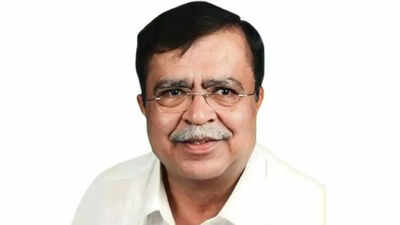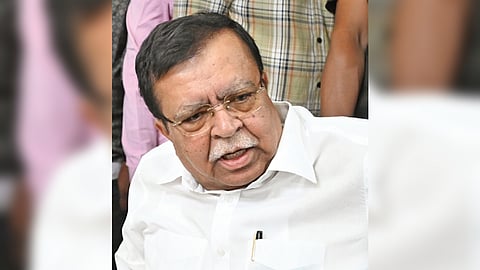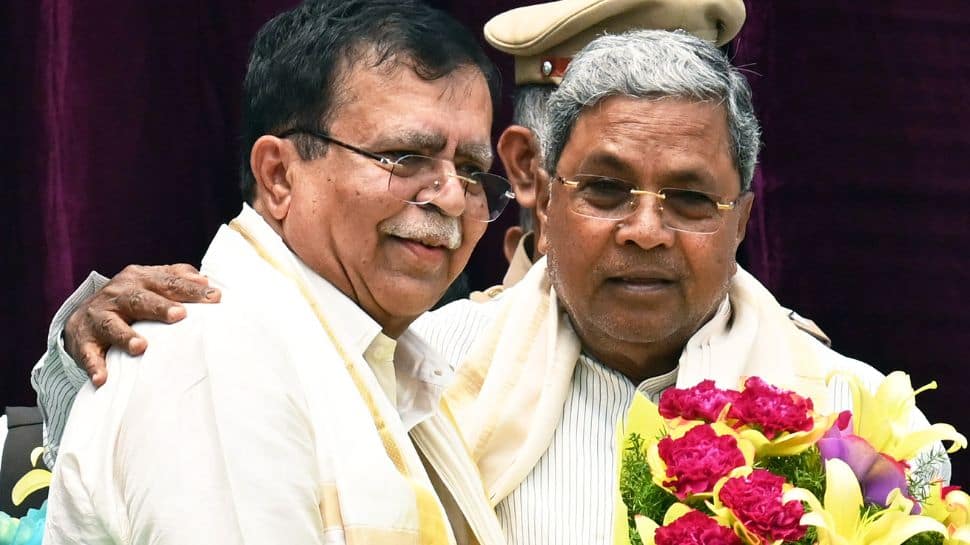Karnataka political is witnessing yet another dramatic twist as dropped minister KN Rajanna declared his determination to return with full force. Speaking boldly, he said, “I too know how to finish someone politically,” making it clear that his exit is far from permanent. Rajanna, who has been a significant player in the state’s Congress dynamics, is now channeling his energy into proving his relevance. His statement carries undertones of both resilience and warning, sending ripples across the state’s political spectrum. Many see this as a strong assertion of his ability to fight back strategically.
Rajanna’s confidence is not unfounded. Over the years, he has built a reputation for being a sharp strategist with grassroots support. Even though he was dropped from the cabinet recently, his loyal base among certain communities remains intact. His political career has been marked by moments of both turbulence and resilience, and this latest episode adds another chapter to his long journey. Rajanna is known for playing a balancing role between factions, and his absence has already left visible gaps. Observers believe that his assertive tone signals that he is preparing for a larger battle within the party framework.
The minister’s remarks also underline the cutthroat nature of politics in Karnataka, where alliances and rivalries shift quickly. While he did not name anyone specifically, his words point to deeper internal struggles within the ruling Congress. His defiance reflects an emotional surge that often resonates well with voters, who admire leaders that refuse to bow down easily. Rajanna’s declaration seems to be not just a warning to his political rivals but also a message of reassurance to his supporters that he is still very much in the game.

Rajanna’s Statement Raises Tension Within Congress
Within the Congress, Rajanna’s words have stirred both concern and curiosity. Senior leaders are reportedly keeping a close watch on the developments, aware that internal conflicts could weaken the party’s standing ahead of future elections. His warning has created a ripple effect, with speculation growing about possible camps forming within the organization. While some leaders see his statement as an emotional outburst, others interpret it as a calculated move to remind the high command of his importance. The Congress leadership may now have to tread carefully to balance these internal power equations.
For the opposition, especially the BJP and JD(S), Rajanna’s remarks come as a fresh opportunity to criticize the ruling party. They argue that the Congress is riddled with infighting and that Rajanna’s statement is proof of instability. Political analysts suggest that if Rajanna mobilizes his supporters effectively, it could create fractures that weaken Congress’s grip in certain regions. The timing of his declaration is also significant, coming at a stage when the party is trying to project unity. Rajanna’s assertiveness ensures that his role in Karnataka politics will continue to dominate discussions in the coming months.
Karnataka’s political atmosphere has always been turbulent, but Rajanna’s latest remarks have introduced a new level of unpredictability. His statement is not merely an expression of defiance but also a calculated attempt to demonstrate his resilience in the face of adversity. The fact that he openly spoke about knowing how to “finish someone politically” reveals that he intends to engage directly with the power struggles within the Congress. His approach has already gained traction among his followers, who see him as a leader unwilling to be silenced or sidelined by party decisions.
The emotional undertone of Rajanna’s statement reflects the sentiments of many leaders who often feel neglected after years of contribution. His supporters argue that his exclusion was unjust and that his experience should be recognized as an asset to the party. By making a powerful declaration, Rajanna has not only defended his position but also inspired sympathy from a segment of voters. This ability to combine emotional appeal with strategic messaging could help him maintain a strong hold in local politics, ensuring that his voice continues to resonate across constituencies.
Rajanna’s ability to bounce back from political setbacks has been demonstrated in the past, which makes his comeback aspirations credible. He has a reputation for mobilizing people at the grassroots level, often working directly with communities to address local issues. His political career has seen multiple ups and downs, but each time, he has returned with greater determination. This latest episode might just be another stepping stone in his attempt to reassert himself within the Congress and prove his continued relevance.
The larger implication of Rajanna’s statement is the reflection of deep-rooted factionalism within the Congress. While the party tries to present a united face, internal rivalries often resurface in moments like these. Rajanna’s open defiance could embolden others who feel sidelined, leading to a chain reaction that weakens the high command’s control. Such dynamics are not new to Karnataka politics, but the timing makes them more crucial, as elections and power negotiations remain ongoing priorities for all political actors.
For voters, Rajanna’s stance adds another dimension to the ongoing political drama. Many citizens are weary of constant infighting and instability, yet they also admire leaders who stand firm despite challenges. His strong words could resonate with those who value determination and fearlessness in their representatives. This dual reaction—both criticism and admiration—creates a complex environment where Rajanna’s political moves may gain traction even outside his traditional support base. His future, therefore, depends not only on party decisions but also on public perception.
The opposition has been quick to use Rajanna’s remarks as ammunition against the Congress. Leaders from rival parties argue that such infighting proves Congress cannot govern effectively or maintain unity. BJP and JD(S) representatives have already highlighted Rajanna’s words in their campaigns, pointing to instability and lack of discipline within the ruling party. By turning his personal struggle into a talking point, Rajanna has inadvertently given opponents a weapon, though he may also be using the attention to position himself more strongly in future political negotiations.

Future Path Uncertain but Spirit Unbroken
Rajanna’s journey reflects both the unpredictability and resilience of Indian politics. While being dropped was undoubtedly a setback, his fiery statement has reignited debates and secured him renewed attention. Whether he stages a comeback through negotiation within the party or by mobilizing people’s support, one thing is clear: he refuses to fade quietly. His emotional yet powerful assertion shows a leader determined to stay relevant and influential. As the political chessboard of Karnataka continues to shift, Rajanna’s next move will be closely watched by allies, rivals, and voters alike.
Rajanna’s personality and leadership style have always been marked by straightforwardness, which appeals to many but also lands him in controversies. Unlike leaders who prefer to remain silent or diplomatic, he has consistently chosen to voice his opinions openly. This boldness has made him a powerful presence but also a target for rivals. His current statement fits into this pattern, showing that he values honesty and confrontation over political silence. Whether this works in his favor or against him will depend on how the Congress leadership reacts in the coming days.
The Congress high command now finds itself in a delicate situation. On one hand, ignoring Rajanna could alienate his support base and risk further divisions. On the other hand, accommodating him might send signals that strong-arm tactics and emotional outbursts are rewarded within the party. Balancing these concerns is a challenge for the leadership, which is already dealing with several competing factions. The decision they take regarding Rajanna’s role will have long-term implications for both party unity and electoral strategy.
In the broader political context, Rajanna’s statement highlights the precariousness of regional politics in India. Leaders often rely on community support and personal networks as much as on party backing. This means that sidelining a leader like Rajanna does not guarantee his irrelevance; instead, it risks creating an independent power center. His insistence on not being ignored may push the Congress to either reinstate him in some form or risk losing influence in areas where his leadership holds sway. This makes his return, in some capacity, a realistic possibility.
Ultimately, the unfolding saga around Rajanna illustrates the blend of power, emotion, and resilience that defines Indian politics. His fiery words represent more than just a personal grievance—they symbolize the struggles of many leaders who fight for relevance within hierarchical party structures. Whether or not Rajanna secures an official comeback, he has already succeeded in making himself a central figure in Karnataka’s current political conversation. By refusing to remain silent, he has ensured that his story continues to shape the narrative and fuel debates across the state.

Follow: Karnataka Government
Also read: Home | Channel 6 Network – Latest News, Breaking Updates: Politics, Business, Tech & More

